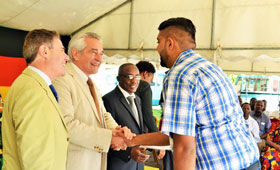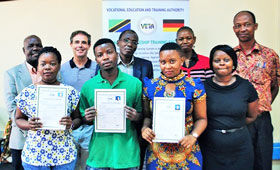Tanzania—vocational education and training puts young people in a stronger position
Tanzania wishes to introduce dual vocational education and training based on the German model. A pilot project conducted by the Hamburg Chamber of Crafts and Trades is bringing young people up to speed. The plan now is for dual training to be introduced across the country on the basis of the project.

Tanzania has taken the decision to introduce a dual training system (Dual Apprenticeship Training System—DATS) based on the German model across the country from 2018. This move has its foundations in a successful pilot project carried out in three sectors (motor vehicle mechanics, the electrical branch, and hotels/tourism) to investigate whether the successful German model is theoretically transferable to the prevailing circumstances in Tanzania. Both the pilot project and the development and establishment of the new training system as an independent educational pathway are being supported by the Hamburg Chamber of Crafts and Trades and receiving financial backing from the Federal Ministry for Economic Cooperation and Development (BMZ).
Tanzania’s journey towards the introduction of a dual training system took place as follows.
In 2008, initial contact was established between the Hamburg Chamber of Crafts and Trades and Mr. Zebadiah Moshi, head of the Tanzanian “Vocational Education and Training Authority” (VETA) at the time. This process was instigated by the late Honorary Consul Jürgen Gotthardt, who invited Zebadiah Moshi to Hamburg as part of the city’s twinning arrangements with Dar es Salaam to familiarise himself with the German dual training system. VETA was convinced by the German model and was persuaded that the German dual system should be transferred to Tanzania and adjusted to meet local conditions. The hope was that this would lead to an increase in both the quality and quantity of vocational education and training in the country with the dual aim of promoting Tanzania’s trade and industry and of combating rising youth unemployment.

The pilot project was launched in 2011. Following an appropriate preparatory period, the first trainees entered the three-year programme in 2013. The 4th cohort is currently undergoing training, and just under 250 young people have completed the dual scheme thus far. The members of the first cohort were awarded their state-recognised qualification in 2016. Most of those completing the programme have been taken on by the companies providing training, whilst others have found employment with another firm.
In May 2017, the Hamburg Senate invited the three trainees who had finished top of their class in the first cohort to travel to Hamburg for four weeks in order to deepen the knowledge they had acquired by visiting companies in the city. This was the first time that the young people involved had left Tanzania, and the trip provided a unique and intensive learning experience.
With the successful launch of dual training models in the motor vehicle mechanics, electrical and hotels/tourism sectors, the pilot project has created a level of VET cooperation between the private sector and VETA which is unprecedented in Tanzania. This would not have been possible without a cultural shift on the part of the companies and at VETA. All of those involved underwent a steep learning curve. Workshops also needed to be adapted in order to fulfil the enhanced requirements. Nevertheless, the outcomes proved a motivation to all stakeholders and convinced the government that the “Dual Apprenticeship Training System” (DATS) should be introduced nationwide from 2018.
The project is financed by the Federal Ministry for Economic Cooperation and Development (BMZ) within the framework of the “Vocational Education and Training Partnership Programme (BBP)” programme via sequa.